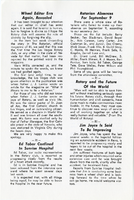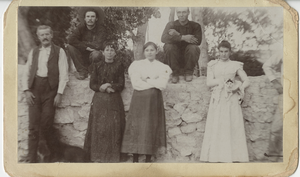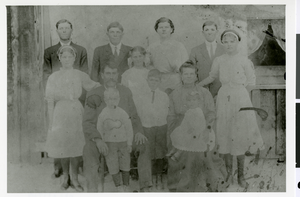Search the Special Collections and Archives Portal
Search Results

The Wheel Las Vegas Rotary Club newsletter, 1960s-1970s
Date
Archival Collection
Description
Text

Sonia Rivelli Jiavis oral history interview: transcript
Date
Archival Collection
Description
Oral history interview with Sonia Rivelli Jiavis conducted by Nathalie Martinez and Barbara Tabach on March 6, 2019 for the Latinx Voices of Southern Nevada Oral History Project. In this interview, Rivelli discusses her life including the evolution of her cultural background and her role in business. She describes how her parents moved to Brazil from Italy and how she has come to value her cultural roots in Brazil, Italy, and the United States. She mentions that travel was a major part of her life and that she has been to North America, South America, and Europe. One of Rivelli's accomplishments in her career was helping the development of the Brazilian community in Las Vegas, Nevada. She also states that she created the Aqua Diva Global water purification company in hopes of providing more safe and clean water to all people.
Text
Gloria E. Hernandez Oral History Interview
Identifier
Abstract
Oral history interview with Gloria E. Hernandez conducted by Nathalie Martinez, Maribel Estrada Calderon, and Rodrigo Vazquez on December 07, 2018 for the Latinx Voices of Southern Nevada Oral History Project. Gloria E. Hernandez starts the interview by recalling her childhood and early years in Jalisco, Mexico. Hernandez relates her experiences during her immigration to Las Vegas, Nevada in 1987. Hernandez discusses her career and her first job in the hospitality industry at the Frontier Hotel and Casino. Gloria shares her role in the longest labor strike in United States history while she was working at the Frontier. Gloria talks about her membership and involvement in the Culinary Workers Union Local 226, primarily talking about her role as a union organizer.
Archival Collection

Alpha Kappa Alpha Sorority, Theta Theta Omega Chapter summer retreat documents
Date
Archival Collection
Description
From the Alpha Kappa Alpha Sorority, Incorporated, Theta Theta Omega Chapter Records (MS-01014) -- Chapter records file.
Text

Photograph of the Stewart family, Las Vegas (Nev.), 1900-1925
Date
Archival Collection
Description
Site Name: Las Vegas Ranch (Las Vegas, Nev.)
Image

Photograph of the Frehner family at their first home on the farm, St. Thomas, Nevada, circa 1913
Date
Archival Collection
Description
Image
Ora Bland oral history interview
Identifier
Abstract
Oral history interview with Ora Bland conducted by Claytee D. White on March 04, 2021 for African Americans in Las Vegas: a Collaborative Oral History Project.
Ora Bland speaks to what she knew of her husband's secretive work at Area 51 of the Nevada Test Site, businesses in the Westside community, and her work in the downtown Las Vegas post office. In addition to her life experiences, Ora shares her thoughts on her community, the state of homelessness that many experience in her surrounding neighborhood, and her activities during the COVID-19 pandemic.
Archival Collection
Urban, Ruth Pearson, 1948-
Ruth Pearson Urban was born in 1948 in Los Angeles, California. At the age of ten, she moved to Las Vegas with her mother and older sister. Urban spent most of her childhood in the Huntridge area and was always heavily involved with Temple Beth Sholom. After graduating from Las Vegas High School, Urban attended the University of Nevada, Las Vegas where she received a bachelor’s degree in social work, and later, a master’s degree in counseling.
Person
Decker, Clarabelle, 1900-1984
Teacher, librarian, and writer Clarabelle H. Decker was born Clarabelle Douglas in Bellevue, Colorado on November 03, 1900. She and her family moved to Oatman, Arizona, where Decker attended Northern Arizona State Teachers College (now Northern Arizona University) and received her Bachelor of Arts degree. She later earned a Master of Arts degree in English and School Supervision from the University of Washington, and a degree in library sciences from the University of Southern California.
Person
